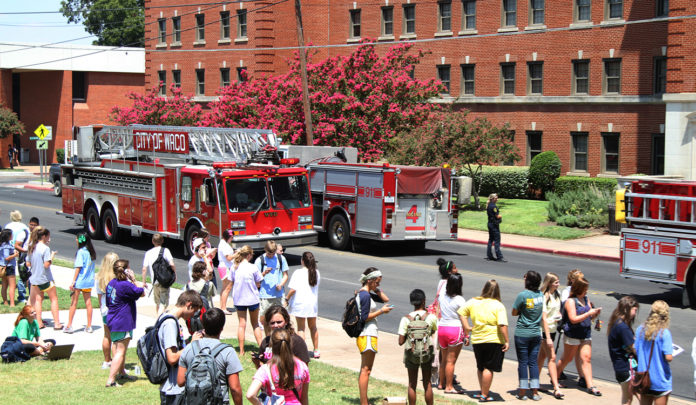
By Ava Dunwoody | Staff Writer
While continuing to create a new normal, residence halls have had to make changes to an aspect of dorm life that may have gone unnoticed: fire safety. No fire drills have been held on campus this semester in order to keep students safe from COVID-19.
Part of Baylor’s Fire Safety mission includes “conducting evacuation fire drills in all on campus residence halls each fall and spring semester,” according to their website. There was a fire drill scheduled within the first 10 days of class, but it was canceled, said Michael Marascia, Baylor’s assistant director of emergency management and fire safety.
“The day of [the planned fire drill], looking at the data, we had over 450 cases campus wide,” Marascia said. “So looking at that data and some residence halls trending upward with cases, we decided to ask the city for a waiver.”
Marascia said after filing for a waiver, Baylor was granted one by the City of Waco that would clear them from the International Fire Code 2015, which states that residence halls must have fire drills.
Instead, all students living on campus received a fire safety brochure by their Campus Living and Learning staff at the start of the year. The brochure said “Fire drills with a full evacuation of the residence hall for the fall semester will not be conducted. However, there are a few safety reminders for you to review.”
These reminders included finding two possible exits for evacuation, face covering policies regarding evacuation and emergency assembling points. Even without a full fire drill, Marascia said it was still important that residence hall fire safety was communicated.
According to the U.S. Fire Administration, there were 118 fire fatalities in college housing from 2000 to 2015, approximating to seven per school year. 29% of these were caused by smoking and others were caused by factors like cooking and electrical issues.
At Baylor, George Nunez, director of emergency management, said all fires on campus must be included in the Annual Fire Safety and Security Report. The report shows in 2018, two fires occurred on campus; both were in Texana House and caused by burnt food.
San Clemente freshman Ava Crossan lives in Texana House and said she doesn’t recall fire safety information given at the start of the year. Especially for students living away from home for the first time, Crossan said it would be smart to have a fire drill to show students how important it is to be prepared.
In the past, Baylor has provided many safety demonstrations alongside semester fire drills. Last year, the Baylor Department of Public Safety held a “Sic ‘em for Safety” campaign where they burned a replica dorm room to demonstrate the consequences of fire hazards.
But this year, none of these events can take place. Instead, Baylor CL&L staff continued to go through their annual fire safety training — including how to use fire extinguishers and handle emergency situations. Marascia said he is personally involved in checking for code violations in every residence hall room.
Crossan said while it makes it harder to understand fire safety protocols, it makes sense that fire drills would go against COVID-19 regulations because gathering in large groups at the same time would be risky. In the event of a real fire, social distancing would be optimal, but unlikely.
“I wouldn’t know what to do [if there was a real fire], Crossan said. “I’d just try to run out of the building, but I don’t think that they’ve even talked about specific ways they want us to get out of the building. I feel like it would be a free for all.”
Marascia said students should do their part to learn about safety regulations and emergency responses by referring to the brochure they were given or talking to their CL&L staff. In the meantime, he said Campus Safety is hoping to be able to put on a fire drill next semester as long as it puts the safety and well-being of the students first.
“Fire safety is extremely important,” Marascia said. “No one plans to have a fire in their room, but it’s the people who are prepared that when something unexpected does happen, they are able to get out safely. It’s very important for the students to follow the message that we do put out there.”
Correction 1:40 p.m. November 5, 2020
A previous version of this article incorrectly quoted Michael Marascia as saying there were 150 cases on campus when fire drills were scheduled.





